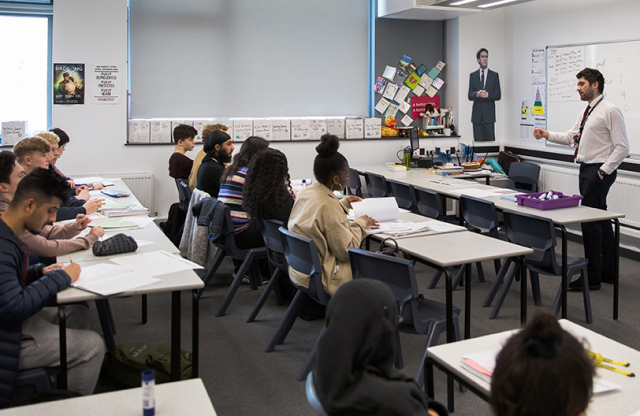School History FAQs

These FAQs are designed to provide a starting point for people who are interested in what is taught in school history in England. Please note that education policy is devolved in the UK and so the situation differs in Scotland, Wales and Northern Ireland. These FAQs focus on state secondary schools.
Is history compulsory in schools?
History is compulsory in secondary schools until the ages of 13 or 14, during which time they usually follow a curriculum based on the National Curriculum: it is up to schools at what age it stops being compulsory. The amount of time pupils get for history varies a lot, but two hours a week would be considered a lot, and some may have significantly less than this. After this the National Curriculum ends and history becomes optional, with typically around 40% of pupils nationally continuing to study the subject to 16, although there is a lot of variation between schools.
Why is something not on the National Curriculum?
Very little is on the National Curriculum. The only specific thing that schools have to teach according to the National Curriculum is the Holocaust. There are then broad requirements to study British history from the middle ages to the present, and to study some non-British history. The curriculum provides a set of aims for schools (e.g. beyond this, it is up to schools to decide what to teach).
It should be noted that if a school is an academy (i.e. not under local authority control) then it in theory does not have to follow the National Curriculum. In practice it will be hard to find a school that differs significantly from it, and indeed Ofsted has recently begun inspecting the curriculum in schools (including academies) and one thing they consider is whether a school’s curriculum has similar scope to the National Curriculum.
- You can read the National Curriculum here (gov.uk website)
The National Curriculum has existed since 1991 and was re-written in 1995, 2000, 2008 and 2014. Curriculum review is a politically-driven process. Various individuals and groups are consulted at different stages in the process, but the government chooses which individuals and groups they want to invite for consultation.
Who decides what is on the GCSE courses?
GCSE specifications (these used to be called syllabuses) are set by exam boards which are independent companies. They have to follow the government’s subject requirements but, as with the National Curriculum, these are very broad. They require all exam courses to cover some medieval, early modern and modern history, some British history and some non-British history. They also require pupils to study a theme over time (e.g. medicine or migration) and local history.
- You can read the subject requirements here (PDF, gov.uk website)
It is then up to exam boards to decide what courses to offer. They will do this in consultation with teachers and other people who work in history when they design their courses. All boards offer a wide range of courses, although in practice there are a relatively small number of very popular topics. These are popular for a range of reasons, but an important consideration for schools is the availability and cost of textbooks and the confidence their teachers have in teaching the courses.
What do schools decide to teach?
All schools are required to publish their curriculum on their website, so you can easily look at schools in your local area. There are some very popular topics that nearly all schools teach (e.g. the Norman Conquest and the First World War). Schools will design their history curriculum based on a range of factors including (a) what the school has taught in the past, (b) what resources are available, (c) the local context of the school and (d) the specialisms of the teachers in the department.
Who writes the textbooks?
Textbooks are published by independent publishing companies. There are currently no ‘government-approved’ textbooks, and the profession has generally been resistant to this. Textbooks are typically written by current or former history teachers, although other specialists do sometimes write books, and are more typically involved in reviewing these before publication.
It should also be noted that history teachers might well be very flexible in their textbook use, perhaps using different books for different parts of a course, or using no books at all.
Do pupils consider different points of view in history lessons?
Both the National Curriculum and the government’s subject guidance for GCSE requires that pupils be taught about how and why the past has been interpreted in different ways. There are often questions about this in textbooks for all age groups, and there are compulsory questions on this in GCSE exams. There is no ‘official’ interpretation of any period and it can be hard to find out what interpretations are considered from a school’s website.
Why do my children not remember what they have been taught?
There are lots of reasons for this. All humans naturally forget things over time, particularly if they are not being asked to recall things about it at a later point. For example, after two or three years of studying the options on a GCSE course, many pupils will have forgotten things they were taught in primary school or the first few years of secondary school. There are things teachers can do to try to help pupils remember what they were taught in the long-term, but this is generally something that both teachers and pupils find difficult.
Where can I get more information?
There are several organisations that support teaching in schools and who can provide more information. The most important are:

